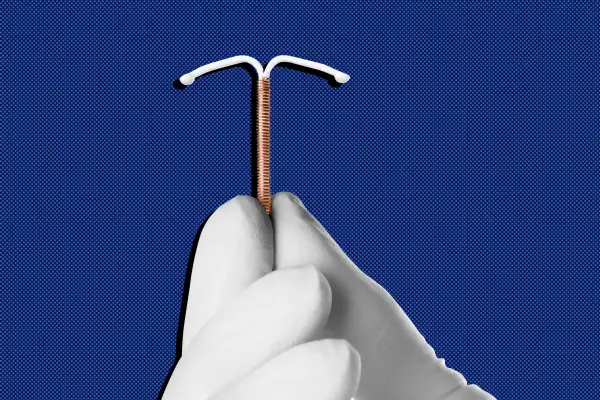How to Get an IUD — Even if You Don't Have Insurance

When the Supreme Court overturned Roe v. Wade last week, revoking the constitutional right to have an abortion, Americans got busy. Folks nationwide poured money into abortion funds, stocked up on Plan B and vowed on social media to support friends in states that are hostile to abortion.
And, amid that flurry of activity, a ton of people started learning everything they could about intrauterine devices, or IUDs.
An IUD is a small, T-shaped instrument that fits inside a person's uterus. It's an increasingly popular method of birth control that's highly effective and long-lasting (most IUDs expire after about five years, though some are good for a decade). And for some people living in Kentucky, Texas and other parts of the country with "trigger laws" that criminalized abortion the moment Roe was overturned, getting an IUD has never been more attractive.
IUDs can be pricey, though.
An IUD insertion — which requires a visit to a medical office — plus the cost of the actual device can run you as much as $1,300 out of pocket, according to Planned Parenthood. That's roughly "a month's full-time salary at the federal minimum wage of $7.25 an hour," the Guttmacher Institute, a reproductive rights research organization, writes on its website.
But there are ways around it.
Does insurance cover IUDs?
The Affordable Care Act, enacted by President Barack Obama in 2010, made it a legal requirement for most health care plans to cover a variety of birth control methods without cost-sharing. That means no co-payments, regardless of whether you've met your deductible.
According to healthcare.gov, those approved methods include birth control pills, diaphragms, sponges, counseling, sterilization, emergency contraception (Plan B) and, yes, IUDs. At one point in 2014, more than 91% of people who received an IUD didn't pay anything out of pocket.
This is where another hot-button political debate comes in. When President Donald Trump took office in 2017, he rolled back the Affordable Care Act's birth control benefit, making an exception for employers with religious beliefs and/or moral convictions. The case went to the Supreme Court, which confirmed in 2020 that those employers could refuse to cover contraception costs for workers. (President Joe Biden has said he's planning to revisit the situation.)
On Monday, the Biden administration wrote a letter reminding health plan sponsors that they're beholden to Obamacare, which, again, "ensures access to coverage, without cost-sharing, for birth control and contraceptive counseling for individuals enrolled in group health plans and group and individual health insurance coverage."
Issuers, it confirmed, must cover "at least one form of contraception in each contraceptive category, as well as contraceptive services or FDA-approved, cleared, or granted contraceptive products that an individual and their attending provider have determined to be medically appropriate." More on that later.
Can you get an IUD for free?
Alas, just because most insurance providers are supposed to cover FDA-approved contraceptives like IUDs with no cost-sharing doesn't mean they actually do. That was part of the Monday letter — penned by Health Secretary Xavier Becerra, Treasury Secretary Janet Yellen and Labor Secretary Marty Walsh — which went on to say the government is aware of "troubling and persistent reports of noncompliance with these requirements" and promised to investigate them.
Also, you should know while your health care issuer must cover both types of IUDs — there are hormonal and copper ones — it isn't required to cover every IUD brand out there. (A caveat: Your insurance does have to help you get a waiver if your doctor recommends a different brand of IUD based on your health history or potential side effects, as they can vary in size and dosage.)
To determine whether your insurance covers only a specific brand of IUD, contact your provider directly.
Mirena has specific instructions for this on its website: Call the number on the back of your insurance card. When you reach a representative, say Mirena is a "healthcare professional-administered method of birth control" and "ask them to check if Mirena is covered at no cost under the Affordable Care Act."
Paragard, which provides similar directions on its website, notes that if your insurance says its IUD isn't a medical benefit, it could still qualify as a pharmacy benefit. To find out, call the number on the back of your prescription card.
How to afford an IUD without insurance
You can still get an IUD even if you don't have health insurance — and you might not have to foot the entire bill. To start, contact local clinics, hospitals and health centers, including Planned Parenthood offices, to see if you qualify for a sliding scale fee program where the cost of your IUD is tied to your income level. You may also want to check into Medicaid, which helps low-income Americans with medical costs.
GoodRx recommends also looking into whether there's a community health center or clinic near you that's enrolled in 340B, a drug pricing program that offers IUDs at a reduced rate.
Some IUD brands also have free patient savings programs that can help you get an IUD at a discount. For Kyleena, Mirena and Skyla, call Bayer's U.S. Patient Assistance Foundation at 1-866-228-7723 or visit its website.
Still need help? Contact the CoverHer team at the National Women’s Law Center, which will help you figure out what your next steps are — for free. Its phone number is 1-866-745-5487, and its email is CoverHer@nwlc.org.
More from Money:
Women Are Buying Up Plan B Because of the Supreme Court
Roe v. Wade Overturned: 12 Ways Abortion Bans Will Hurt Americans Financially
